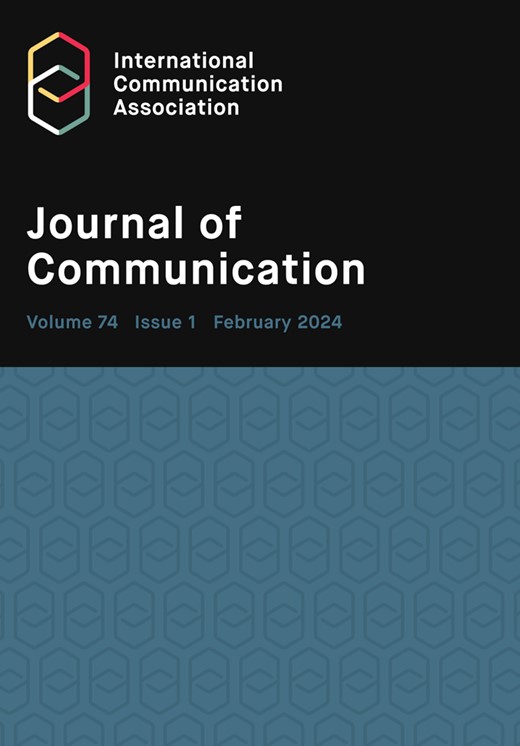The madness of misperceptions: evaluating the ways anger contributes to misinformed beliefs
IF 5.5
1区 文学
Q1 COMMUNICATION
引用次数: 2
Abstract
Drawing from established theoretical traditions in cognitive consistency, motivated reasoning, heuristic–systematic processing, and the anger-activism model, we extend existing work linking anger with misperceptions by specifying three distinct ways anger might contribute to the formation of misperceptions: Increasing reliance on partisan heuristics, influencing political information-seeking behavior, and moderating the influence of partisan media exposure. Analyzing data from an original survey administered nationally via Qualtrics Panels during the first impeachment trial of President Donald Trump in January 2020, results indicate that high-anger partisans were more likely to express belief in claims supportive of their party and critical of the other party, regardless of the veracity of those claims. Further, anger was also linked with greater use of pro-attitudinal information sources and avoidance of counterattitudinal sources, with these differences in partisan media consumption subsequently influencing factual beliefs. However, we found no evidence that anger moderated the relationship between partisan media exposure and factual beliefs. We explore the implications of these findings in a political era defined increasingly by the experience of anger.误解的疯狂:评估愤怒导致错误信念的方式
根据认知一致性、动机推理、启发式-系统处理和愤怒-行动主义模型等已建立的理论传统,我们扩展了将愤怒与误解联系起来的现有工作,具体说明了愤怒可能导致误解形成的三种不同方式:增加对党派启发式的依赖,影响政治信息寻求行为,以及缓和党派媒体曝光的影响。分析了2020年1月唐纳德·特朗普总统第一次弹劾审判期间由Qualtrics Panels在全国范围内进行的一项原始调查的数据,结果表明,无论这些说法的真实性如何,高愤怒的党派更有可能表达对支持自己政党和批评另一方的言论的信仰。此外,愤怒还与更多地使用支持态度的信息源和避免反对态度的信息源有关,这些党派媒体消费的差异随后影响了事实信念。然而,我们没有发现任何证据表明愤怒调节了党派媒体曝光与事实信念之间的关系。我们探讨了这些发现在一个日益由愤怒经历定义的政治时代的含义。
本文章由计算机程序翻译,如有差异,请以英文原文为准。
求助全文
约1分钟内获得全文
求助全文
来源期刊

Journal of Communication
COMMUNICATION-
CiteScore
11.60
自引率
5.10%
发文量
41
期刊介绍:
The Journal of Communication, the flagship journal of the International Communication Association, is a vital publication for communication specialists and policymakers alike. Focusing on communication research, practice, policy, and theory, it delivers the latest and most significant findings in communication studies. The journal also includes an extensive book review section and symposia of selected studies on current issues. JoC publishes top-quality scholarship on all aspects of communication, with a particular interest in research that transcends disciplinary and sub-field boundaries.
 求助内容:
求助内容: 应助结果提醒方式:
应助结果提醒方式:


